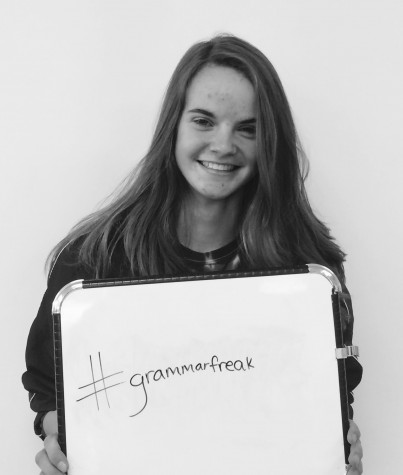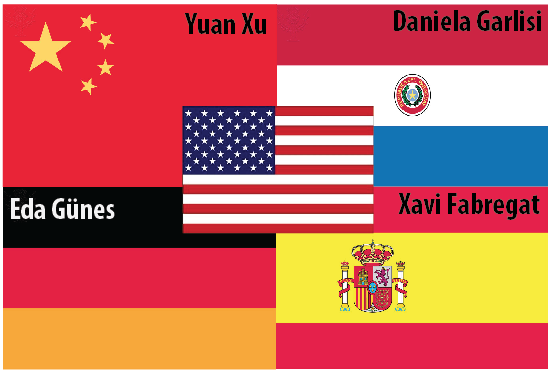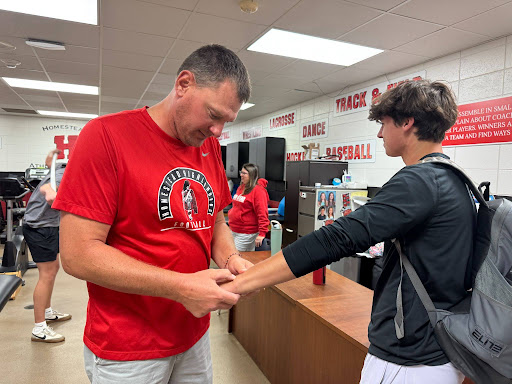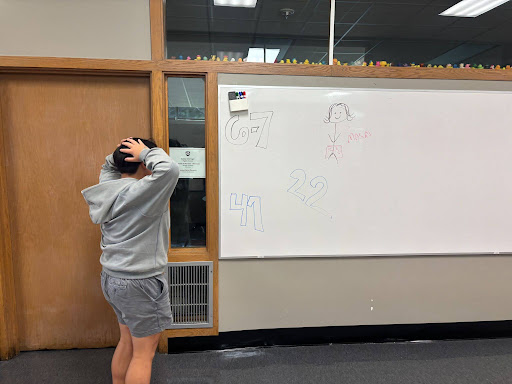Meet the AFS students
Every year, a small group of teenagers visit Mequon from countries all around the world through the American Field Service (AFS) program. While living in Mequon, they fully experience American culture while living with host families and attending Homestead as seniors. This year’s AFS exchange students are Eda Günes from Germany, Xavi Fabregat from Spain, Daniela Garlisi from Paraguay and Yuan Xu from China.
What were you most afraid of coming to Mequon?
Günes: That I [wouldn’t] find friends.
Fabregat: That I would miss the lifestyle I had in Barcelona.
Garlisi: The most [intimidating] thing about coming to Mequon was how difficult [it] would be [for] me to adapt and how difficult [it] would be to speak in English.
Xu: Mequon is a little town, but I used to live in a city. I was afraid that I [could not] get used to this.
What is different about Homestead compared to your school at home?
Günes: There’s so much spirit in Homestead it’s crazy, and everybody is way more friendly than in German schools.
Fabregat: You have a different schedule everyday and you have the same people every class for 13 years (in Spain).
Garlisi: At home, I have classes only until 11 a.m., I have the same classmates all year long and the teachers switch classrooms, not the students. Also in my school we [have] in total only 700 students, so I think those are really big differences between my school at home and Homestead.
Xu: We have eight classes a day, each class is 45 minutes. After that, we have self study (kind of like study hall, but can’t use any computers, phones, etc.). The most horrible thing to you guys [is] maybe this: you have to self study until 8 p.m. (if you are a fortunate sophomore). Most of the students, like juniors and ALL seniors, if there are no special things going on, will have to have self study till 9:15 p.m. You can’t choose the subjects you want. Everyone has to study the same things. The things we learn [are] much more difficult than the things Homestead teaches. We have different classes everyday too. We have only three grades in our high school: sophomore, junior, and senior. All your grades (EVERY SUBJECT) are shown to EVERYONE in your class (even your classmates’ parents), everyone knows if you are the first or the last in the class.
What is the most different thing to you about America?
Günes: Food.
Fabregat: The fact that you have to be sleeping very early, in Spain I used to go to sleep [at] 1-2 a.m. every day.
Garlisi: The most different thing for me in America is the schedule and the meals because in Paraguay the biggest meal is lunch and we have dinner at at least 9 p.m. and [it] is not a big meal. The other thing that is really different is that I can’t go anywhere if I don’t have someone who can drive me.
Xu: The most different thing would be the people say a lot of “thank you’s”.
What is the hardest thing to adjust to living in Wisconsin?
Günes: Weather and you can’t just go anywhere without a car.
Fabregat: I think the winter is going to be the hardest thing to get used to, where I come from I have 70 degrees all year round.
Garlisi: For me the hardest thing to adjust [to] in Wisconsin is the weather because in Paraguay [it] is really warm all the time. Our winter is about 50 (degrees) and is only that cold for about 15 days.
Xu: Weather… My host mom said I may not be able to survive winter…

Erin Connolly, self-diagnosed grammar freak, is a senior barely hanging on to her sanity. Three sports and three AP classes later, Erin can often be found...
Sydney Roeper, who rides the struggle bus frequently, is a girl unlike any other. On any given day, Sydney can be found either at the ice rink, practicing...







